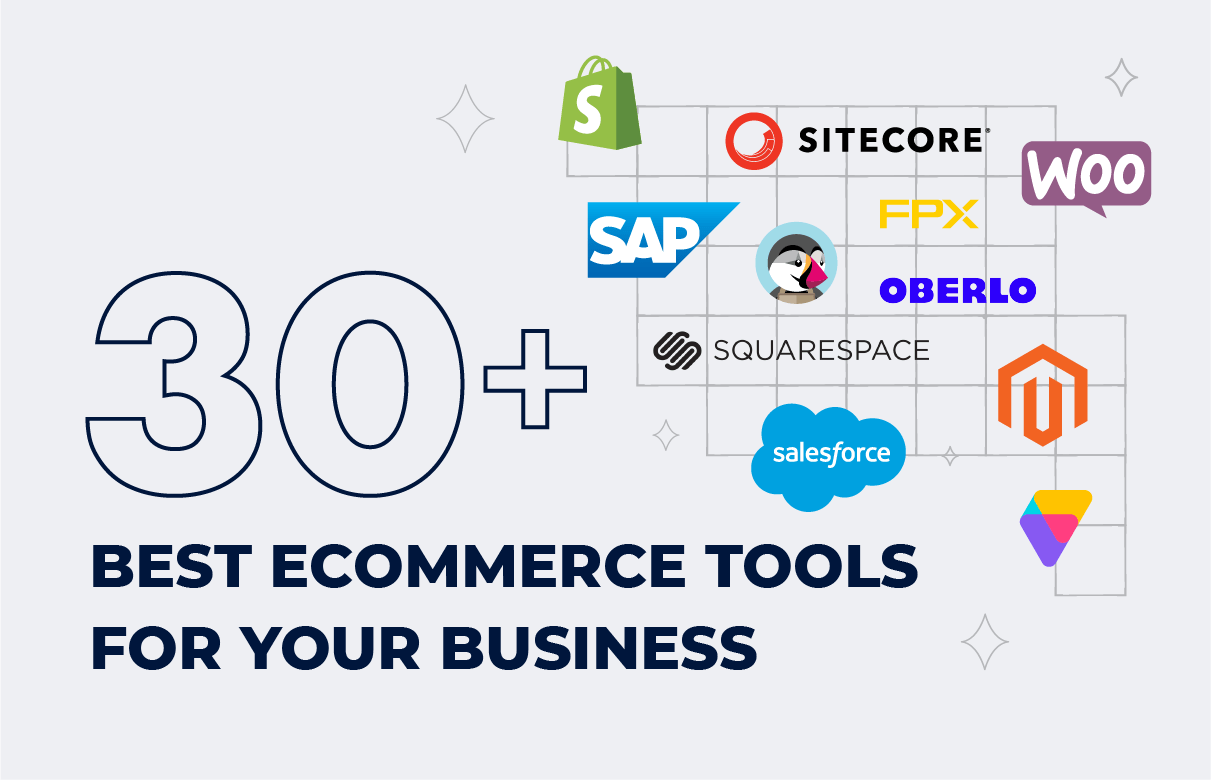
Ecommerce tools can transform your online business. They simplify tasks and boost efficiency.
In the digital age, choosing the best ecommerce tool is crucial for growth. The right tools can help you manage inventory, process payments, and improve customer experience. With countless options available, finding the perfect fit can be overwhelming. Understanding the importance of these tools is key.
They streamline operations and drive sales. Efficient ecommerce tools save time and reduce errors. They enhance the shopping experience for your customers. This blog will guide you through the best ecommerce tools available. You will learn about their features and benefits. By the end, you will have a clear idea of which tool suits your business needs. Let’s dive in!

Credit: www.sam-solutions.com
Introduction To Ecommerce Tools
In today’s digital age, ecommerce tools play a crucial role. They help online businesses streamline operations and enhance customer experiences. Understanding these tools can give your online store a competitive edge. This section introduces you to ecommerce tools, their importance, and the benefits they offer.
Why Ecommerce Tools Matter
Ecommerce tools are essential for online stores. They simplify complex tasks and save time. These tools help manage inventory, process payments, and analyze customer data. They also support marketing efforts and improve customer service. Without them, running an online store can be challenging and less efficient.
Key Benefits For Online Stores
Ecommerce tools offer numerous benefits to online stores. They automate repetitive tasks, reducing manual work. This leads to faster and more accurate operations. They also provide valuable insights through analytics. This helps store owners make informed decisions. Additionally, these tools enhance the shopping experience for customers, leading to higher satisfaction and loyalty.
Another advantage is scalability. Ecommerce tools grow with your business. They adapt to increasing demands and complexities. This flexibility ensures that your store can handle more customers and orders as it expands.
Website Builders
Website builders are essential tools for creating an online store. They help users design, manage, and publish websites without coding knowledge. Whether you are a beginner or an experienced user, a good website builder can make the process smoother and more efficient.
Top Website Builder Options
Choosing the right website builder is crucial for your ecommerce success. Here are some top options:
- Shopify: Known for its user-friendly interface and robust ecommerce features.
- Wix: Offers a drag-and-drop builder with many customizable templates.
- Squarespace: Provides elegant designs and powerful tools for small businesses.
- BigCommerce: Suitable for large-scale businesses with extensive product catalogs.
- WooCommerce: A flexible, open-source solution for WordPress users.
Features To Look For
Not all website builders are created equal. Here are some key features to consider:
- Ease of Use: Look for an intuitive interface and simple navigation.
- Customizable Templates: Ensure there are plenty of design options.
- Mobile Responsiveness: Your site must look good on all devices.
- SEO Tools: Built-in tools to help your site rank better on search engines.
- Integration Options: Check for compatibility with payment gateways and other tools.
- Customer Support: Reliable support can save you time and hassle.
Here is a comparison table for a quick overview:
| Feature | Shopify | Wix | Squarespace | BigCommerce | WooCommerce |
|---|---|---|---|---|---|
| Ease of Use | ⭐⭐⭐⭐⭐ | ⭐⭐⭐⭐ | ⭐⭐⭐⭐ | ⭐⭐⭐⭐ | ⭐⭐⭐ |
| Customizable Templates | ⭐⭐⭐⭐ | ⭐⭐⭐⭐⭐ | ⭐⭐⭐⭐⭐ | ⭐⭐⭐⭐ | ⭐⭐⭐ |
| Mobile Responsiveness | ⭐⭐⭐⭐ | ⭐⭐⭐⭐⭐ | ⭐⭐⭐⭐ | ⭐⭐⭐⭐ | ⭐⭐⭐ |
| SEO Tools | ⭐⭐⭐⭐⭐ | ⭐⭐⭐⭐ | ⭐⭐⭐⭐ | ⭐⭐⭐⭐ | ⭐⭐⭐⭐ |
| Integration Options | ⭐⭐⭐⭐⭐ | ⭐⭐⭐⭐ | ⭐⭐⭐⭐ | ⭐⭐⭐⭐⭐ | ⭐⭐⭐⭐⭐ |
| Customer Support | ⭐⭐⭐⭐⭐ | ⭐⭐⭐⭐ | ⭐⭐⭐⭐ | ⭐⭐⭐⭐⭐ | ⭐⭐⭐ |
Shopping Cart Solutions
Shopping cart solutions are essential for any ecommerce business. They help manage orders and streamline the checkout process. With the right shopping cart tool, you can improve customer experience and increase sales. Let’s explore some popular shopping cart tools and how to choose the right one for your business.
Popular Shopping Cart Tools
Several shopping cart tools are popular among ecommerce businesses. These tools offer various features to enhance your online store.
Shopify: Shopify is a user-friendly platform. It offers a wide range of customization options. It integrates well with various payment gateways.
WooCommerce: WooCommerce is a powerful plugin for WordPress users. It provides flexibility and control over your online store. It’s perfect for those who want to tailor their shop to their needs.
BigCommerce: BigCommerce offers robust features for growing businesses. It supports multiple sales channels and provides excellent customer support.
Magento: Magento is ideal for large businesses. It offers advanced features and scalability. However, it requires more technical knowledge to set up and manage.
How To Choose The Right One
Choosing the right shopping cart tool depends on your business needs. Here are some factors to consider:
Ease of Use: Look for a tool that is easy to use. It should have a simple interface and clear instructions.
Customization Options: Your tool should offer customization options. This allows you to create a unique shopping experience for your customers.
Integration: Ensure the tool integrates with your existing systems. This includes payment gateways, shipping providers, and marketing tools.
Scalability: Choose a tool that can grow with your business. It should handle increased traffic and sales as your business expands.
Support: Good customer support is crucial. Look for a tool that offers reliable support to help you solve any issues quickly.
Payment Gateways
Payment gateways are essential for any ecommerce business. They allow customers to make purchases online securely. Choosing the right payment gateway is crucial for building trust with your customers. It also impacts your overall sales and user experience.
Secure Payment Options
Security is a top concern for online transactions. A reliable payment gateway ensures that customer data is encrypted. This protects sensitive information from fraud and breaches. Look for gateways that comply with PCI DSS standards. They provide an extra layer of security for all transactions.
Some popular secure payment options include PayPal, Stripe, and Square. These platforms offer robust security features. They are trusted by millions of users worldwide. Offering these options can help increase customer confidence. It may lead to higher conversion rates for your store.
Integrating Payment Gateways
Integrating a payment gateway into your ecommerce site should be seamless. Most platforms offer plugins or APIs for easy integration. These tools make the process straightforward, even for those with limited technical skills.
Start by selecting a payment gateway that fits your business needs. Check for compatibility with your ecommerce platform. Follow the provided instructions for installation. Many gateways offer customer support to assist you during the setup process. This ensures everything runs smoothly.
Once integrated, test the payment gateway thoroughly. Make sure it processes transactions correctly. Ensure it provides a smooth checkout experience for your customers. This step is crucial for maintaining a professional and trustworthy online store.
Inventory Management
Effective Inventory Management is critical for the success of any eCommerce business. Managing inventory can be challenging without the right tools. These tools help maintain stock levels, track products, and prevent overselling. This section explores the best inventory management tools to streamline your eCommerce operations.
Best Inventory Tools
The right inventory tool can make a big difference. It helps you organize and manage your stock efficiently. Here are some top inventory management tools:
- TradeGecko: This tool offers inventory tracking, order management, and reporting features.
- Zoho Inventory: Known for its easy integration with various eCommerce platforms.
- SkuVault: Focuses on reducing human errors and improving efficiency.
- Stitch Labs: Provides advanced inventory control and automation.
Each tool has its unique features. Choose the one that fits your business needs.
Streamlining Stock Control
Streamlining stock control is important. It helps you manage your inventory effectively. Here are some tips:
- Regular Audits: Conduct regular audits to ensure stock accuracy.
- Use Technology: Implement inventory management software to automate tasks.
- Organize Your Warehouse: Keep your warehouse organized for easy access.
- Set Reorder Points: Define reorder points to avoid stockouts.
By following these tips, you can keep your inventory organized. This ensures smooth operations and customer satisfaction.
Customer Relationship Management
Customer Relationship Management (CRM) is crucial for ecommerce businesses. It helps manage interactions with current and potential customers. A good CRM system allows you to understand your customers better. This understanding can lead to improved customer satisfaction and increased sales. Let’s explore the best CRM tools for ecommerce and how they enhance customer engagement.
Crm Tools For Ecommerce
Choosing the right CRM tool can make a big difference. Popular options include Salesforce, HubSpot, and Zoho CRM. These tools offer features tailored for ecommerce. They help track customer behavior and preferences. You can also manage customer data and communications in one place. This makes it easier to provide personalized experiences.
Salesforce is known for its robust features. It integrates well with many ecommerce platforms. HubSpot offers a free version that is great for small businesses. Zoho CRM is affordable and scalable. All three tools provide analytics to help you make informed decisions.
Enhancing Customer Engagement
CRM tools help you engage with customers more effectively. Automated emails can be sent based on customer actions. For example, a welcome email when someone signs up. Or a follow-up email after a purchase. This keeps your brand top-of-mind.
Personalization is another key feature. CRM tools allow you to segment your audience. You can send targeted messages to different groups. This makes your communication more relevant and engaging. Customers are more likely to respond to personalized messages.
Another benefit is better customer support. CRM systems track all customer interactions. This helps your support team respond quickly and accurately. Happy customers are more likely to return and make repeat purchases.
Marketing Automation
Marketing Automation is a powerful tool for ecommerce businesses. It helps manage marketing processes and campaigns across multiple channels automatically. It saves time and resources, allowing businesses to focus on strategy and growth.
Top Marketing Automation Tools
There are several top marketing automation tools that can help streamline your ecommerce marketing efforts. Here are a few:
| Tool | Features |
|---|---|
| HubSpot | Email marketing, lead management, analytics |
| Mailchimp | Campaign management, audience segmentation, reporting |
| Marketo | Lead nurturing, social marketing, analytics |
| ActiveCampaign | Email automation, CRM, sales automation |
Boosting Sales With Automation
Marketing automation can significantly boost sales for ecommerce businesses. Here are some key benefits:
- Personalized Marketing: Tailor messages to individual customers based on their behavior and preferences.
- Increased Efficiency: Automate repetitive tasks like email campaigns and social media posts.
- Better Customer Insights: Gain valuable data about customer interactions and behaviors.
- Improved Customer Experience: Ensure timely and relevant communications with customers.
With marketing automation, you can create more effective marketing strategies. This leads to higher conversion rates and increased revenue.
Analytics And Reporting
Analytics and reporting are crucial for the success of any ecommerce business. They provide insights into customer behavior, sales trends, and operational efficiency. Understanding these metrics can help you make informed decisions to improve your business.
Ecommerce Analytics Tools
Many tools are available to help analyze your ecommerce data. Google Analytics is one of the most popular options. It tracks website traffic, user behavior, and conversion rates. Other tools like Kissmetrics and Mixpanel offer more advanced features. They focus on user engagement and customer lifecycle analytics.
These tools allow you to segment your audience. You can see which products are popular among different demographics. This helps in tailoring marketing strategies. The goal is to maximize revenue and customer satisfaction.
Tracking Performance Metrics
Tracking performance metrics is essential for growth. Key metrics include conversion rate, average order value, and customer acquisition cost. These metrics show how well your business is doing. They also highlight areas for improvement.
Conversion rate tells you how many visitors make a purchase. A low rate might mean your website needs optimization. Average order value shows the average amount spent per order. Increasing this value can boost your revenue. Customer acquisition cost reveals how much you spend to get a new customer. Keeping this cost low improves profitability.
Regularly monitor these metrics. Use them to guide your business decisions. This will ensure sustainable growth and success.
Conclusion And Recommendations
Choosing the right ecommerce tool can make a big difference for your online store. The right tool helps you manage your inventory, track sales, and provide a good customer experience. It can also save you time and money.
Let’s look at some final thoughts and tips for choosing the best ecommerce tool for your store.
Final Thoughts
There are many ecommerce tools available. Each has its own strengths and weaknesses. Some tools offer more features. Others are easier to use. Your choice depends on your specific needs.
Think about what is most important for your store. Do you need a tool that offers good customer support? Or do you need a tool with advanced analytics? Make a list of your priorities.
Choosing The Best Tool For Your Store
Start by researching the top ecommerce tools. Look at reviews and ratings. See what other business owners say about them. This can give you a good idea of what to expect.
Next, try out a few tools. Many offer free trials. Use these trials to see how the tools work. Check if they meet your needs. Look for tools that are easy to use. This can save you time and frustration.
Consider your budget. Some tools are more expensive than others. Make sure you choose a tool that fits your budget. But remember, sometimes it is worth paying a bit more for a better tool.
Finally, think about the future. Your business will grow. Choose a tool that can grow with you. Look for tools that offer scalable solutions. This means they can handle more sales and customers as your business grows.

Credit: www.revechat.com

Credit: tagshop.ai
Frequently Asked Questions
What Is The Best Ecommerce Tool?
The best ecommerce tool depends on your business needs. Popular options include Shopify, WooCommerce, and BigCommerce for their user-friendly features.
How Do I Choose An Ecommerce Tool?
Consider factors like budget, scalability, features, and ease of use. Research and compare different platforms to find the best fit.
Can I Use Ecommerce Tools For Small Businesses?
Yes, many ecommerce tools cater to small businesses. They offer affordable plans and easy-to-use features to help you start and grow.
Are Ecommerce Tools Secure?
Most ecommerce tools provide robust security features. These include SSL certificates, secure payment gateways, and regular updates to protect your business and customers.
Conclusion
Choosing the best ecommerce tool can boost your online business success. It helps streamline operations, improves customer experience, and drives sales. Evaluate your needs, budget, and business goals. Make a smart choice that fits your requirements. The right tool will save you time and increase efficiency.
Remember, a good ecommerce tool is a valuable investment. Start exploring options today and watch your business grow. Happy selling!




